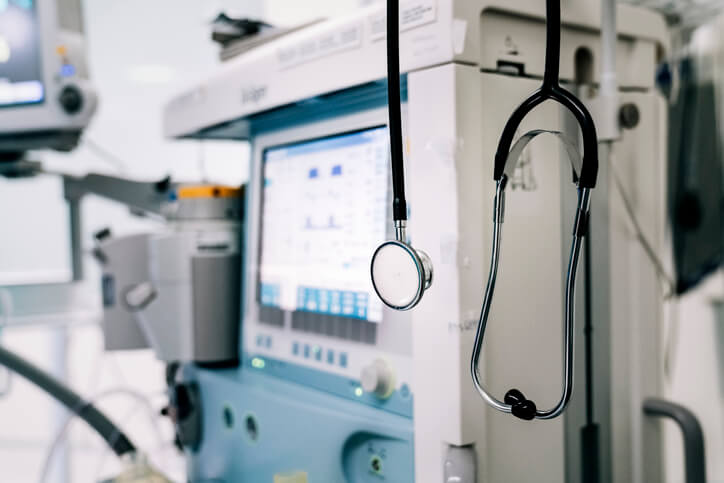
How COVID-19 Has Raised Interest in Respiratory Therapy
The COVID-19 pandemic declaration in March of this year brought a global and national focus on ventilators, intubating and breathing machines. As the virus rapidly spread, more people also began to hear about the frontline professionals who were using these tools to battle COVID: respiratory therapists (RTs).
Now more people are asking, “What is respiratory therapy and what do RTs do?”
According to Thomas J. Kallstrom, MBA, RRT, FAARC, executive director, American Association for Respiratory Care (AARC), COVID-19 has "consumed" the respiratory therapy profession.
"Seventy-five percent of employed respiratory therapists work in the nation's hospitals," Kallstrom said. "There are 155,000 RTs in the U.S. Only the sickest with COVID are in the hospital. And those who are extremely sick go to the intensive care unit where many are placed on mechanical ventilation.”
“The respiratory therapist manages the ventilators,” he continued. “Their job is to monitor and assess the patient–ventilator interaction, with the goal being to wean them off as soon as possible, of course, based on their pulmonary status. Respiratory therapists care for non-intubated patients, as well. Because of the recent media attention, we have seen more attention and interest in the profession."
Here are some great Apps you can use to prioritize stress relief.
The media coverage on COVID and respiratory therapy professionals who are battling the disease have included features in countless news sources, including The Wall Street Journal, The New York Times, USA Today, and NBC News.
A doctor in a Washington Post article recently wrote:
"This was one of many times a respiratory therapist saved the day throughout my career. They serve as the glue that brings everything together when we doctors manage patients with respiratory illnesses. They're often the first to be called by nurses when a patient is having trouble breathing. They know more about oxygen, breathing support, and ventilators than most others in the hospital. They work complex machines, suction secretions from the airway, take patients off the ventilators and, in many hospitals, they even position the breathing tube in the first place or teach trainees how to do so."
RAISING THE PROFILE OF RTS, AND THEIR ONGOING IMPORTANCE
COVID-19 has helped expose the expertise and knowledge that respiratory therapists bring to the healthcare setting, according to Timothy R. Myers MBA, RRT, RRT-NPS, FAARC, chief business officer, AARC. He called respiratory therapists "the only didactic and clinically trained healthcare professionals on the art and science of mechanical ventilation of the critically ill patient."
"The unique skills and knowledge of the respiratory therapist played a vital role in the survival of countless COVID-19 patients during the ongoing pandemic," Myers said. "Early data suggest that COVID-19 has a prolonged impact on the cardiopulmonary system for infected patients, which will need the unique skills that the respiratory therapist brings to the rehabilitation and chronic disease management of pulmonary patients.”
“This increase in pulmonary patients, along with other well-known chronic respiratory diseases, is going to increase the importance and need for respiratory therapists in ambulatory or outpatient settings,” he added.
Myers also pointed out a potential negative impact of COVID-19 on the profession, which relates to college and university programs. These RT programs have already seen a decrease in enrollments in recent years. Financial strains at colleges and universities, exacerbated by the pandemic, may result in the closure of some of these programs—at a time when the profession must replace retirees and provide additional therapists to meet increasing patient demand.
Yet, COVID-19 has helped raise interest in the field of respiratory therapy, while demand for RTs continues to grow for a variety of reasons.
"One reason is that we need them [respiratory therapists] to care for COVID patients, especially in pockets of the nation where there are hot spots or extreme numbers of diagnosed and sick COVID patients," Kallstrom said.
"But the other is definitely due to an aging population of baby boomers where pulmonary disease is common,” he continued. “Chronic obstructive pulmonary disease (COPD) often presents itself after 40 years of age. Once diagnosed early, it is better for the patient to be treated."
A large proportion of practicing RTs are baby boomers themselves, which is also affecting the retirement rates. Kallstrom said the AARC is seeing a large shift in the age of practicing respiratory therapists as the boomers retire. The year 2020 was projected to be a peak year when working RTs turned age 65.
TRAVEL JOBS FOR RESPIRATORY THERAPISTS
Kallstrom said that he sees more RT travelers being employed because of COVID, and there are many opportunities for RTs to travel to areas of need.
"We saw this at the peak of COVID and expect to see the same this fall and winter," he said. "Some respiratory therapists are coming out of retirement to help locally and to be travelers."
Finally, Kallstrom noted that the COVID-caused changes to the RT profession are ongoing.
"We learned that respiratory therapists needed proper training on a multitude of stockpile mechanical ventilators," he said. "We learned about how best to ventilate patients with COVID. But as more brands are projected to enter the stockpile, that education will be all the more important."
Related:
CLUB STAFFING has hundreds of opportunities for travel respiratory therapists, and other allied healthcare professionals.
SEARCH RT JOBS or APPLY TODAY to take the first step in your travel career.

